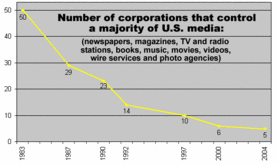 In case you thought media ownership in increasingly fewer hands
was a uniquely U.S. problem,
here’s a handy graphic illustrating its worldwide scope.
There are links to the research behind it.
In case you thought media ownership in increasingly fewer hands
was a uniquely U.S. problem,
here’s a handy graphic illustrating its worldwide scope.
There are links to the research behind it.
-jsq
 In case you thought media ownership in increasingly fewer hands
was a uniquely U.S. problem,
here’s a handy graphic illustrating its worldwide scope.
There are links to the research behind it.
In case you thought media ownership in increasingly fewer hands
was a uniquely U.S. problem,
here’s a handy graphic illustrating its worldwide scope.
There are links to the research behind it.
-jsq
 The net in the U.S. is so slow even the mainstream media have finally noticed:
The net in the U.S. is so slow even the mainstream media have finally noticed:
The USA trails other industrialized nations in high-speed Internet access and may never catch up unless quick action is taken by public-policymakers, a report commissioned by the Communications Workers of America warns.Of course, we’re not going to get internationally competitive speeds until there are some serious structural changes in the ISP “marketplace”, producing more competition somehow. And broadband isn’t the point; Internet access is. Plus speed alone is trivial; without choice and participation it’s nothing. But speed helps draw in participants, and once we’re online, speeds lets us do more things. So it’s good that USA Today is paying attention; maybe its readers will, too. Then maybe they’ll ask for something better than two turtles.The median U.S. download speed now is 1.97 megabits per second — a fraction of the 61 megabits per second enjoyed by consumers in Japan, says the report released Monday. Other speedy countries include South Korea (median 45 megabits), France (17 megabits) and Canada (7 megabits).
“We have pathetic speeds compared to the rest of the world,” CWA President Larry Cohen says. “People don’t pay attention to the fact that the country that started the commercial Internet is falling woefully behind.”
— U.S. Net access not all that speedy, By Leslie Cauley, USA TODAY, posted 25 June, updated 26 June 2007
-jsq
 While we’re on the general subject of
postal and Internet rates and a free press,,
let’s look at who owns the U.S. media:
While we’re on the general subject of
postal and Internet rates and a free press,,
let’s look at who owns the U.S. media:
In 1983, 50 corporations controlled the vast majority of all news media in the U.S. … When the 6th edition of The Media Monopoly was published in 2000, the number had fallen to six. Since then, there have been more mergers and the scope has expanded to include new media like the Internet market. More than 1 in 4 Internet users in the U.S. now log in with AOL Time-Warner, the world’s largest media corporation.This might be worth remembering the next time you hear that the market will sort out any problems and there’s no need for regulation. Would that there were a market so that that could be true.In 2004, Bagdikian’s revised and expanded book, The New Media Monopoly, shows that only 5 huge corporations — Time Warner, Disney, Murdoch’s News Corporation, Bertelsmann of Germany, and Viacom (formerly CBS) — now control most of the media industry in the U.S. General Electric’s NBC is a close sixth.
— Number of corporations that control a majority of U.S. media, Media Reform Information Center, accessed 21 June 2007
-jsq
What did the telephone companies have to do with inventing the Internet?What did they invent? Continue reading
Nothing.
The browser?
Nothing.
The World Wide Web?
Nothing.
What have they had to do with the Internet from the beginning of time?
Nothing.–Bob Kahn